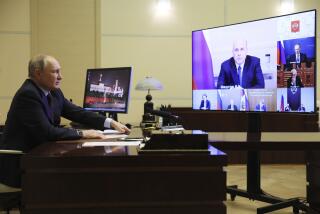India Faces Fallout for Stand Against Nuclear Test Ban Pact
- Share via
NEW DELHI — This week, India showed it could say no to the great powers.
After the United States and the four other avowed nuclear-weapons nations declined to bind themselves to a timetable for liquidating their arsenals, India effectively vetoed the global nuclear test ban pact being negotiated in Geneva by refusing to sign it.
International criticism was immediate, but the Indian government has vowed not to budge.
“There is no question of a change in our position even if we get isolated,” Prime Minister H.D. Deve Gowda said.
For frustrated U.S. disarmament negotiator Stephen Ledogar, India’s position smacked of insincerity.
“The real reason is that the current government in New Delhi wants to maintain the Indian nuclear weapon option,” he charged.
That is true, Indian security experts acknowledged in interviews. Their country, they contend, is in a unique predicament.
China, a known nuclear power, and Pakistan, like India a “threshold” state that may already have nuclear bombs, are its immediate neighbors, and India has fought wars with both.
By agreeing to the Comprehensive Test Ban Treaty negotiated over the past 2 1/2 years, the Indian specialists maintain, India would be handcuffing its defense options.
This country’s sole nuclear test to date, an underground blast on May 18, 1974, in the desert of Rajasthan, was officially described as peaceful. Since then, India claims it has built no bombs.
“If we want to weaponize, we have to test,” said Savita Pande, a fellow at the Institute for Defense Studies and Analyses, a government-funded New Delhi think tank.
Suspicion is rife among the Indian elite that the draft text that has been on the table at the 61-nation Conference on Disarmament would discriminate against nuclear “have-nots” to the benefit of the “haves.”
“And why shouldn’t we want to be a member of that club?” asked Pande, who has just completed a book on the test ban treaty and Indian security and who advocates building an Indian bomb.
Arundhati Ghose, India’s ambassador at the Geneva conference, squarely blamed the declared nuclear weapons powers--Britain, China, France, Russia and the United States--for the negotiations’ failure.
Those five countries rejected India’s demand that they commit themselves to a timetable for eliminating their warhead stocks.
Ghose also objected that the draft treaty would allow nuclear “haves” to keep modernizing their arsenals with computers while barring less advanced nations like India from developing nuclear arms because of the ban on testing.
Since it was Prime Minister Jawaharlal Nehru who led the call for a comprehensive ban on testing in 1954, there is a large dash of irony in India’s current stance. New Delhi, in fact, had co-sponsored the Geneva draft with the United States until suddenly changing tack last year.
By the time Gowda’s government took power June 1, the political consensus in New Delhi was that a test ban without an accompanying commitment to nuclear disarmament flew in the face of India’s security needs.
“This is a mess we got ourselves into,” Pande said. “It was the greatest mistake to co-sponsor the [treaty] with a country we share nothing with.”
The Geneva conference had hoped to deliver a text for signing by world leaders at the U.N. General Assembly next month. According to Ledogar, the countries still in favor of the treaty can either present the agreement as a resolution to be voted on by the General Assembly or convene an independent signing ceremony.
But China, Pakistan and Russia have all expressed reservations about a pact lacking India’s signature, and Ghose on Thursday warned that her country would not allow the draft treaty in its current form to be voted on at the U.N.
More to Read
Sign up for Essential California
The most important California stories and recommendations in your inbox every morning.
You may occasionally receive promotional content from the Los Angeles Times.










